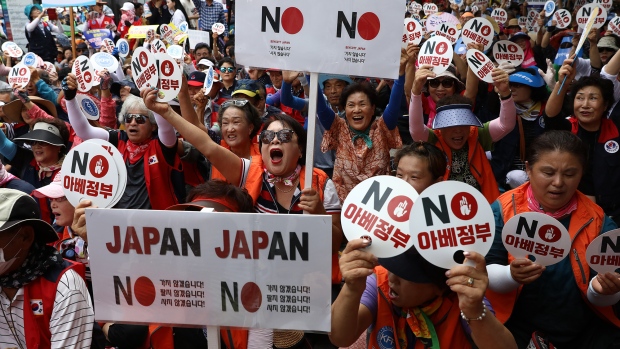Aug 14, 2019
Japan-South Korea Ties Tested Again as Region Marks War’s End
, Bloomberg News

(Bloomberg) -- The anniversary of Japan’s defeat in World War II posed the latest challenge to ties between Seoul and Tokyo, with leaders on both sides expected to make statements that could aggravate their simmering feud.
South Korea was slated to mark the 74th anniversary of Japan’s surrender with a speech by President Moon Jae-in and protests against Japanese Prime Minister Shinzo Abe planned in Seoul. Meanwhile, Abe was set to make his own remarks on the occasion, which some Tokyo lawmakers commemorate with a visit to a controversial war shrine.
Both capitals will be watched closely for clues on whether the two key U.S. allies will ratchet up or calm tensions that have flared in recent months. Disputes over whether Japan has sufficiently atoned for its 1910-45 occupation of the Korean Peninsula sit at the heart of the feud, with South Korean efforts to secure more compensation for individual victims enraging Tokyo.
The politically charged anniversary falls less than two weeks after Abe’s cabinet approved the unprecedented step of removing South Korea from a listed of trusted export destinations, prompting Seoul to say it would respond in kind. While Japan says the move was based on national security concerns, Moon has denounced it as economic retaliation over court rulings in favor of forced labor claims.
The disagreement has consequences for U.S. efforts to fortify its Asian security network against threats from China and North Korea, with South Korean officials saying they might withdraw from a bilateral agreement with Japan on the exchange of military information. U.S. President Donald Trump has expressed frustration with the dispute, saying last week the two sides “got to get along because it puts us in a very bad position.”
In Tokyo, Emperor Naruhito was also expected to deliver his first war-end speech since ascending ascending the throne in May after the abdication of his father. Former Emperor Akihito included a mention of “deep remorse” in his speech every year since the 70th anniversary of his own father Hirohito’s acceptance of the Allies’ terms of surrender on Aug. 15, 1945.
By contrast, Abe has sought to put the old disputes in the past, saying in 2015 that future generations couldn’t be expected to keep apologizing. He has removed references to the destruction wrought by Japan during the war from his own annual speech, and last year omitted a customary reference to Japan being a country that “abhors war.”
The day is also marked at Tokyo’s Yasukuni Shrine, which is dedicated to the memory of Japan’s war dead and seen in China and South Korea as a symbol of its past militarism because 14 Class A war criminals are memorialized there. Abe has not paid respects there in person since 2013 -- opting instead to send offerings -- but a group of lawmakers makes a regular pilgrimage.
In one possible positive sign for ties, Japan granted the first export license to South Korea last week under a new stricter monitoring system. The move lessened fears the clampdown could halt supplies of essential materials to some of the world’s largest technology firms.
In South Korea, where Aug. 15 is celebrated as Liberation Day, Moon was expected to address wartime issues in a speech. A coalition of more than 750 civic groups said it also hoped to muster tens of thousands of demonstrators for a “No Abe Action” rally in central Seoul.
On Wednesday, Moon attended the unveiling of a new statue honoring the so-called comfort women, who were trafficked to Japanese Imperial Army brothels across Asia before and during the war. “The South Korean government will do its best to restore the dignity of and respect for the victims of wartime crimes of the Japanese military,” Moon said in a message delivered to the organizers of the ceremony.
Another wild card is North Korea, where leader Kim Jong Un has resumed missile launches in recent weeks. The regime tends to mark the end of the war with statements celebrating founder Kim Il Sung’s contributions to the defeat of the Japanese, rather than displays of modern military might.
To contact the reporters on this story: Isabel Reynolds in Tokyo at ireynolds1@bloomberg.net;Jihye Lee in Seoul at jlee2352@bloomberg.net
To contact the editors responsible for this story: Brendan Scott at bscott66@bloomberg.net, Ruth Pollard
©2019 Bloomberg L.P.







